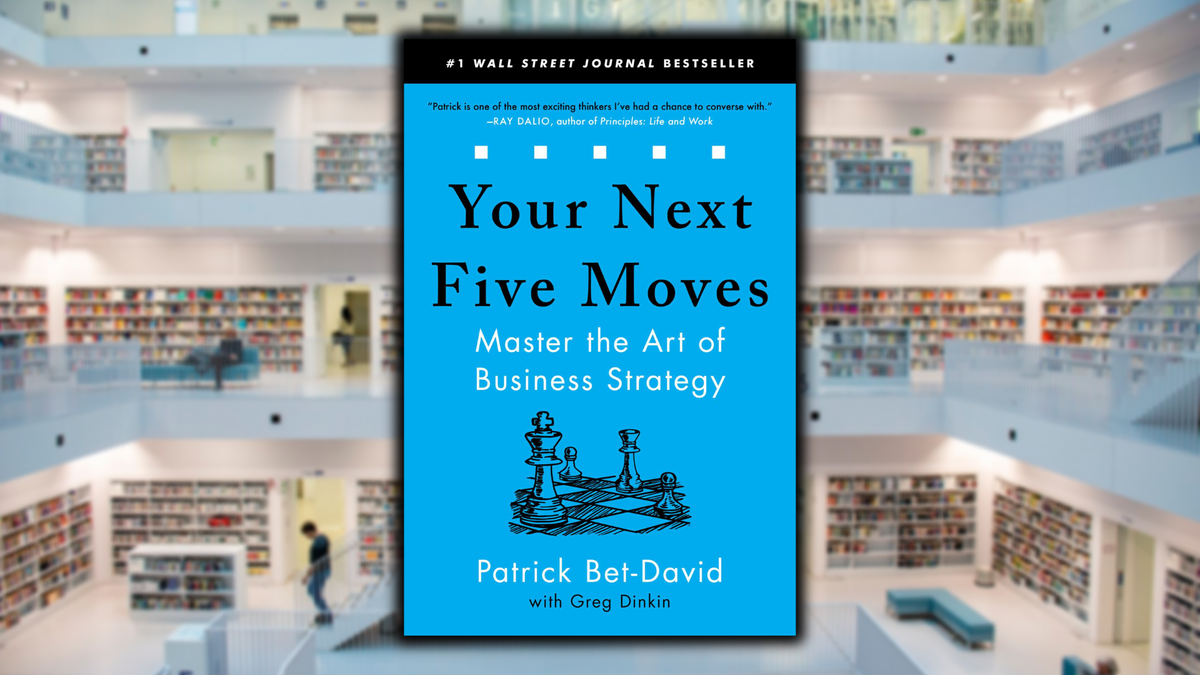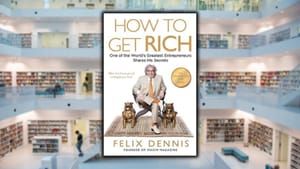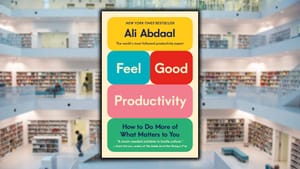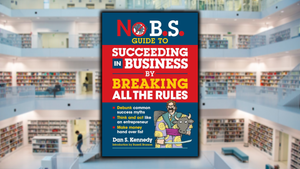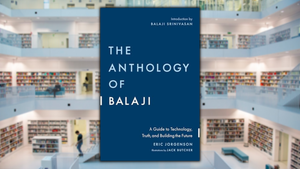
This Book is For:
*Aspiring leaders looking for clarity about what they want, who they want to be, and the specific skills they'll need to develop to ensure they get there.
*Driven entrepreneurs who want to take their businesses, their careers, and their lives to the next level, and learn from the very best in the world what it really takes to elevate their contribution and their success to stratospheric heights.
*Everyone who feels as though they've run up against the limit of their potential (hint: they haven't), and wants to discover what it takes to lead an extraordinary life at the highest level of business and entrepreneurship.
*Professionals within any organization who are searching for an edge to help them reason better than their peers, strategize more effectively than their competitors, and rise higher than the rest.
Summary:
“Your vision must align with who you want to be. Your choices must align with your vision. Your effort must align with the size of your vision. Your behavior must align with your values and principles.”
-Patrick Bet-David
Your Next Five Moves completely overwhelmed my expectations going into it and provided me with a wealth of business and leadership knowledge in just a few hours that I'll be able to use and profit from for the rest of my natural life.
Such is the power of reading!
Bet-David himself is a huge proponent of reading, gathering knowledge from wherever he can find it, and learning from people he disagrees with. That's one of his strongest competitive advantages, in fact, and this book is just laced with competitive advantages you can adopt for yourself too.
What's more, he earned the wisdom he's dispensing in these pages, having literally escaped from Iran as a child, joined the U.S. army as a young man, and launched a stratospherically successful company (several of them, in fact) as an adult. I came into this book cold, and now I usually stop my scroll immediately and listen whenever I see Bet-David show up on my screen.
Your Next Fives Moves is a high-level, high-impact playbook for how you can maximize your effectiveness in five areas: gaining self-knowledge, mastering the ability to reason, developing and building the right team, learning strategy to scale, and deploying power plays that will help you negotiate more effectively and take down some of the biggest competitors in your industry. This book will show you how to do it all.
The overarching theme of this book is the absolute necessity of thinking several moves ahead if you want to succeed in business, especially if you want to make a bigger impact than just earning a comfortable living. There’s nothing wrong with having a goal like that – something I love Patrick for emphasizing – but if you do decide to set bigger goals for yourself, you need to develop a work ethic to match.
Your discipline has to be as unshakable as your dreams are large, or you’re just not going to get there.
Moreover, we all need to understand that the most important person you’ll ever study will be yourself. Yet, most people are so concerned with other people and what they’re doing that they never take the time and make the effort to gain invaluable self-knowledge. In this book, Patrick Bet-David clearly and lucidly lays out why this is a tragic misstep that you need to avoid at all costs.
He also argues - again, rightly - that what separates average business owners from exceptional leaders and entrepreneurial visionaries is the ability to anticipate future events and plan effectively well before they actually happen. By thinking, planning, and strategizing at least five moves ahead.
Your competition isn't doing this.
Your meager competition isn't doing this, I should say. The competitors you should be worried about absolutely are thinking several moves ahead, and if you want to play at the same level as them you need to elevate the quality and substance of everything that you're doing in your business.
You need to combine devastating offense with awesome defense and then you have to move forward with sickening consistency and unrelenting passion.
This is how you separate yourself. This is how you enter the highest echelons of business and show the world that you deserve to be there.
When the rest of the people you're competing against are mired in today's problems and dealing with the challenges threatening their existence right now, you'll be living, thinking, planning, and acting in a larger, brighter, more distant future that they will just never be able to get to.
This book will help you outwork, out-improve, out-strategize, and outlast your competition, and it’s written by someone who’s actually done the work himself; he’s done exactly what he’s telling his readers to do, and that kind of accountability and authenticity is something you hold onto for dear life once you’ve found it in a person.
None of this is going to happen by accident, just like Patrick Bet-David didn't just "stumble" into his massive success. It was intentional, it was planned, and by utilizing the strategies he lays out in this book, it became damn near inevitable.

Key Ideas:
#1: Visionaries Are Already Living Five Moves Ahead
“A visionary is someone who is not living in the here and now. He or she has already seen at least five moves ahead and is living in that reality.”
Every business idea, every spectacular achievement, and every great adventure all started inside the mind of the person who would eventually make it real in the external world.
Everything starts in the mind, and it's the job of the leader to craft a compelling vision of the future, inhabit it inside their own mind, and then inspire people to follow them there.
We naturally want to follow people who see clearly where they intend to go, and who can persuade us that it's worthwhile making the effort to get there. We follow people who know exactly where they are going, and who have the audacity to believe that it's their destiny to arrive there.
If you want to become a great leader, you need to maintain that vision as a living reality inside your own mind, long before anyone else is going to be capable of seeing it out there in the "real" world. You need to have made that same trip in your mind countless times before and transmit that vision to the people you seek to lead. There is no other way.
Ask anyone who has ever won an Olympic medal whether they visualized themselves up on that podium long before it ever happened. Every single one of them will say, "Yes, absolutely. It was real in my mind before it ever became a reality to anyone else."
Then, not only do you need to hold that energy but you also have to make it visible and compelling to others. This is the essence of leadership. It's why you are the leader and they are your followers.
#2: Act Like It Before You Become It
“You must act like a great entrepreneur long before you ever become one.”
"Act as if" is one of the most powerful success strategies I've ever adopted for myself and it's worked for countless people before me. To be clear right up front: this is not the same thing as "fake it until you make it." The two may sound the same, but they are wildly different.
Faking it means pretending that you're someone you're not...all the while deluding yourself that you might "accidentally" become that person in the future.
By contrast, "acting as if" means to intentionally adopt the identity of the kind of person you wish to become, and, most importantly, to adopt the beliefs, attitudes, and actions of that person right now.
You are literally acting as though you are the person you're seeking to become; you're not trying to trick yourself or others into thinking that you already are that person. Catch the difference?
Whatever your desired identity - in this case, as a leader - you have to behave as that person would behave now. As we discussed above, you have to live in that future reality and embody the highly qualified, exceptional leader that you're becoming. An example might help make this clearer.
In my own life, I would observe the people in my current reality behaving in ways that I wanted to behave, achieving the results that I wanted to achieve and so I asked myself these kinds of questions:
"Who do these people associate with?"
"What do they do with their time?"
"What actions do they take on a daily basis in order to do what they do?"
"What do they NOT do?"
"Who do they NOT spend time with?"
"What do they AVOID doing?"
I'd ask myself these kinds of questions constantly, and, slowly but surely, a picture started to form in my mind of how I would need to behave if I wanted to develop into a great entrepreneur myself.
Obviously, this is an infinite game, so I certainly haven't "arrived" yet or anything, but I now consciously choose to behave in a manner concordant with the type of person I want to become.
This is about identity change as much as about anything else. I am acting as if I am already a highly successful entrepreneur, a dynamic, passionate YouTuber, an insanely disciplined fitness model, etc. But, you have to realize that I never started out as any of those things!
I had to act my way into those roles, and I'm still acting! But what you'll find is that when you keep taking the kinds of actions that the people you admire are taking on a daily, continuous basis, eventually you wake up to discover that you are that person and then you just never go back.
#3: How to Tell When You're Winning
“You’ll know you’re succeeding in life when others are winning simply because of their association with you.”
An easy way to tell whether you're winning in life is to count how many people are better off just by knowing you. How many other people are winning because they are in your circle? How many success stories have you been an integral part of?
It's not nearly as impressive to be doing extremely well for yourself when the people around you are struggling. That goes for the people in your immediate friend group, your family, your local community, your country, and even the entire world.
Leaders cause the tides that raise all ships. Leaders step up and bring the people around them with them to a brighter, richer future, and the more people you've caused to live a better life, the more successful you are.
#4: An Entrepreneur is a Professional Problem Solver
“The ability to solve problems well is the ability to take a complex issue you’re facing and break it down into a step-by-step formula that helps you identify the root of the problem.”
There are plenty of fantastic books out there on decision-making, among them being Principles, by Ray Dalio, Decisive, by Chip and Dan Heath, and Rigging the Game, by Dan Nicholson. Each of them lay out extremely effective frameworks for sifting through the information you have on hand and using it to make the best decision possible.
What Patrick Bet-David says is that what all these processing formulas have in common is essentially a three-step process:
- Sorting the information you have to the best of your ability, and making an informed choice as to which moves have the highest likelihood of success.
- Subjecting every problem, opportunity, or decision you face to systematic mental analysis to determine its structure.
- Simulating the outcome of various choices and options you have available to determine the hidden features, second-order consequences, and likely end states of your selected mode of action.
What you're doing here is simply applying a pre-determined decision-making framework to every major obstacle between where you are now and where you want to go. In even simpler terms, you're identifying a series of steps you can take to approach every problem you face in your business and run each new scenario through all of those steps until you settle on a possible way forward.
In Step 1, all that's required is getting most of the available information you need. You'll never be 100% prepared and you'll never have 100% of the information you could have in front of you, but often, 70-80% of the available information is enough to give you an idea of what you should do.
In Step 2, what you're doing is asking what kind of problem this is, whether you've faced it before, how you or others have handled it, and how most successful people usually handle this same issue.
In Step 3, you just toss out potential solutions and play them out in your mind to their logical conclusions, always thinking five moves ahead to what could happen, and what could then happen because of that other thing. You're visualizing how the future could play out if you make any number of available moves, and determining which moves are likely to get you closer to your goal.
All decision-making is made up of this three-step process. Gather information, figure out what type of problem it is, and then make a hypothesis about the best move to make from here.
Then, you take that next move and see what happens, all the while making sure you're recording the results, so you can feed that information through your process the next time around and make an even more informed decision.
#5: Nobody Succeeds Alone
“The best leaders have the ability not only to believe in future truths but also to inspire others to believe and execute their vision.”
The myth of the self-made man is just that: a myth. Even Arnold Schwarzenegger, in his foreword to Tim Ferriss's book, Tools of Titans, says "I am not a self-made man." That's literally the first line of his introduction, and if Arnold says that there's no such thing as a self-made man, that should pretty much be enough to push that whole concept out of your mind for good.
Everybody had help getting to where they are in life, and that's just the way it is! Especially for the ultra-successful people in our society. I mean, if nobody paid to go see one of his movies or voted for him to become governor, Arnold wouldn't have been able to do any of those things! As they say, if you want to go fast, go alone. But if you want to go far, go together.
So there's absolutely no shame whatsoever in accepting others' help to become successful and reach your goals. You're better off that way, and so if you're going to enlist help, you may as well do it the right way by utilizing the leadership principles in this book.
One of the first things you have to do here is to inspire people and facilitate their own growth and evolution as they grow into the people capable of helping you build your dream. As a leader, your job is to make great teamwork possible, to get the buy-in of those people under your flag, and to bring people with a diverse set of skills and aptitudes together in pursuit of a common cause.
Alright, so how do you actually do this? How do you attract the best talent to your organization and strengthen their commitment to the cause?
The way Bet-David does this is by offering equity in his businesses to his star performers. I always try to do this as well, by splitting my profits with the people who made those same profits possible. Sure, all employees of a business a paid an hourly wage or a salary, but offering equity means that if the business makes more money, they make more money as well.
If you work at a coffee shop, for example, you're still going to be earning the same hourly wage no matter how many coffees you serve each day. Now, there's nothing "wrong" with working a job like that, but an example of offering equity would be distributing shares of a company to the employees who help build it. Thus, when the value of the company goes up, their net worth goes up as well, as their financial interests are perfectly aligned with the financial health of the company.
Patrick Bet-David mentions in the book that the software giant Microsoft has, so far, created 3 billionaires and more than 12,000 millionaires. They do this by offering equity and making it much more advantageous for their star performers to stay with Microsoft than for them to seek their fortune somewhere else.
So what's your move here? Grant equity in your business to your star performers in order to retain them over the long term and prevent them from working for someone else – maybe even against you.
If you provide them with amazing incentives to stay and generous thank yous for their help in assisting the growth of your business, they are going to have a much harder time leaving when someone tries to attract them away. And someone always will.
Think of it this way: people virtually always act in their own self-interest. The smart move is to align the incentives in such a way that your self-interest matches up perfectly with theirs.
#6: Nobody is Crazy
“He looked at me as if I were delusional. I looked at him in confusion, wondering how anyone could think so small when the market potential was so big. I was chasing history books; he was chasing a simpler life.
Stuart is driven by the idea of having financial freedom. He makes half a million dollars a year and barely has to work. He knew what drove him, and he got it. He probably looks at my life and feels as though he dodged a bullet.
Why would he possibly put up with all the stress and endure the hundred-hour workweeks and constant pressure when he is driven by financial freedom? Are you seeing where I’m going with this?
You have to know what drives you. It’s going to be different for everybody.
Once I realized what drove me, I didn’t need an alarm clock. It’s the reason that even though I now have financial security, I’m more motivated than ever. It’s why I’ve endured those hundred-hour workweeks. It’s why the minute I feel the smallest amount of self-pity creep in, I stop and remind myself: this is what you signed up for.”
#7: The Pain is Just Too Great
“The pain of owning a business is too great to tolerate just for money.”
There's an outdated theoretical model in the field of economics that states that people are "rational actors" that always seek to maximize their "utility;" or, in other words, to make the most money possible.
This is not always true. That model of behavior just isn't accurate anymore, if it ever was. In the world of work, sure, paying people more is generally more attractive than paying them less for the same job. That much is obvious. More money is better than less money for the same work.
Increasingly, however, it just isn't enough to make the best people stay.
There are far more powerful motivators of human behavior than just the flimsy carrot of more cash. People desperately want to be appreciated for the work they do; they want to do work that matters; they want to be part of an excellent, cohesive team; they want to follow an inspiring leader toward a vision of the future that's exciting and compelling.
Cash is cool, but meaning matters more.
As a business leader, it's even more true for you. The pain of owning a business - the pressure, the uncertainty, and the struggle - is far, far too great to tolerate just for the money. There have to be additional motivations that make you want to grow a business and lead a team. If you're just in it for the money, you're probably just going to quit like everyone else when it gets hard.
Growing a business, increasing profits, and making more money is great and all, but just that isn't enough; it's not enough for most leaders, and it's certainly not enough to make your star performers stay. And even if by some miracle they do stay, it's highly unlikely that they'll do great work.
Interestingly, a growing number of people are willing to take massive pay cuts in order to gain massive increases in work satisfaction! It's a trend that's only going to accelerate as the world becomes richer and more abundant.
As they say, entrepreneurs are the only people willing to work 90 hours a week just so they don't have to work 40. And I can tell you that, even for myself, I used to work 90 hours a week for much less money than other people were making by working just 40 hours a week. But I was building my business from the ground up, relentlessly, joyfully, and I didn't care about the money.
I cared about the freedom, the meaning, and the tremendous personal satisfaction of releasing great work.
I remember times when I didn't have enough money for groceries, so I had to use gas station points to buy chocolate bars just so that I'd have something to eat. And that's not even the half of it! But my point here is that my entrepreneurial story isn't special by any means. We all face tremendous challenges as leaders.
If you're running a business, you're going to have angry customers hurling abuse at you through the phone; you're going to have to deal with your website going down in the middle of the night and inconveniencing some of your best customers; you're going to be late with paychecks and have employees furious and disappointed; you're going to have key suppliers let you down at the worst possible time. And it won't end there...
The headaches are just going to stack on top of each other and compound your stress, but you're going to deal with it, and you're going to prevail over the worst odds, because the game of business is the only game you want to play, and it's also the last best fight there is.

Book Notes:
“Become who you are by learning who you are.”
-Pindar
“When I discover who I am, I’ll be free.”
-Ralph Ellison
“When you’ve decided what your best life looks like and execute that vision, you won’t be envious.”
“We are trained to believe in climbing other people’s ladders. First, you climb the school ladder: get good grades, get into a good college, and then try to get into an even better law, business, or medical school.
If you excel on the school ladder, you get to start climbing the corporate ladder: work for a comfortable salary, and do work with no personal meaning so you can climb your way up to middle management. Then you’ve reached ‘security.’ That’s a lie, as those who have climbed the ladder can attest.”
“If you’re going to lose, don’t lose the lesson.”
“The Latin root of the word ‘decision’ means ‘to cut off.’ When you make a decision, you are cut off from taking some other course of action. Now, that may sound limiting, but it’s not; it’s liberating. Plus, the alternative is indecision and stagnation.”
“Treat your people right, or someone else will.”
“If you have a plan in place for how to replace every key member of your team, you can handle an unexpected exit without missing a beat. Plus you’ll sleep better at night, knowing your next several moves are already planned out.”
"If you want love without conflict, get a dog.”
“I can’t lead people if I don’t know who they are.”
“The less your business depends on you, the more valuable it is.”
“If 30 percent or more of your revenue comes from one place, you’re in trouble.”
“The irony is that each time you step up, you have to start at the bottom.”
“The world today is counting on us to solve big problems that will never stop coming.”

Important Insights from Related Books:
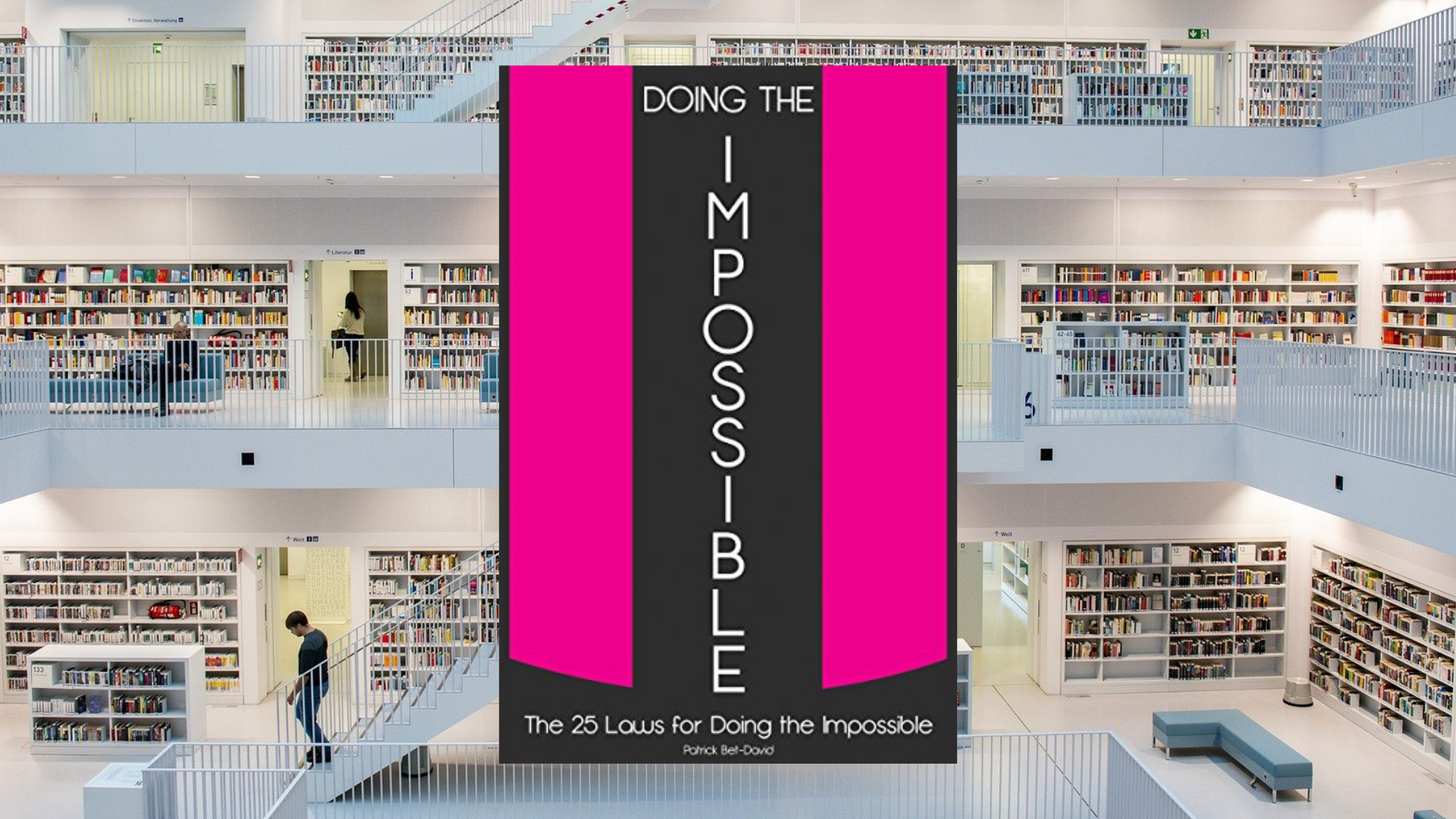
Doing the Impossible, by Patrick Bet-David:
I like to think of Patrick Bet-David as kind of like an Iranian-American Jordan Peterson.
For one thing, he's one of the most impressive individuals I've ever discovered on social media, and his YouTube channel, Valuetainment, reaches more than 3 million subscribers, so I'm definitely not alone in that opinion.
Bet-David is strong-willed, confident, inspiring, and opinionated, and possesses the hard-earned self-belief of an absolute winner. But what's also impressive is how open he is to having his mind changed.
He consistently invites guests onto his podcast with whom he shares ideological differences and gives them all a fair hearing. He wants to learn. He wants to be right, sure, but mostly he wants to find out the truth, regardless of where the truth comes from.
Doing the Impossible is one of his earliest books, and I think of it like the Tao Te Ching of self-improvement books: a short read that you can finish in an hour, but could think about for the rest of your life.
If you're ready to step up and into who you know you could be, this book is the one you should read next.
You see, too often, we forget how capable we really are. We need to believe in ourselves the same way that Patrick Bet-David believes in us, and arm ourselves with the tools, tactics, and mindset we need in order to extract the absolute most from our virtually limitless potential. That's what Doing the Impossible is about.
I've written previously (over and over again) that you don't need to achieve anything massive in order to be a valuable, infinitely worthy human being. You don't need to achieve the impossible or do anything other than just exist in order to be worthy of unconditional love and unconditional positive regard.
But...
If you do wish to attempt the impossible - if you wish to turn the impossible into the imaginable and then the actual - then this is the book you need by your side.
Sample Quotes from the Book:
“A visionary is someone who is not living in the here and now. He or she has already seen at least five moves ahead and is living in that reality.”
“If the impossible throughout history has become the imaginable, and then the actual, why do we think that our dreams are impossible for us to accomplish in our own lives?”
“It may take years for us to actually transform into the person we see ourselves as; but once we truly believe that is the person we are meant to be, eventually we find a way to embody that identity.”
Read the Full Breakdown: Doing the Impossible, by Patrick Bet-David
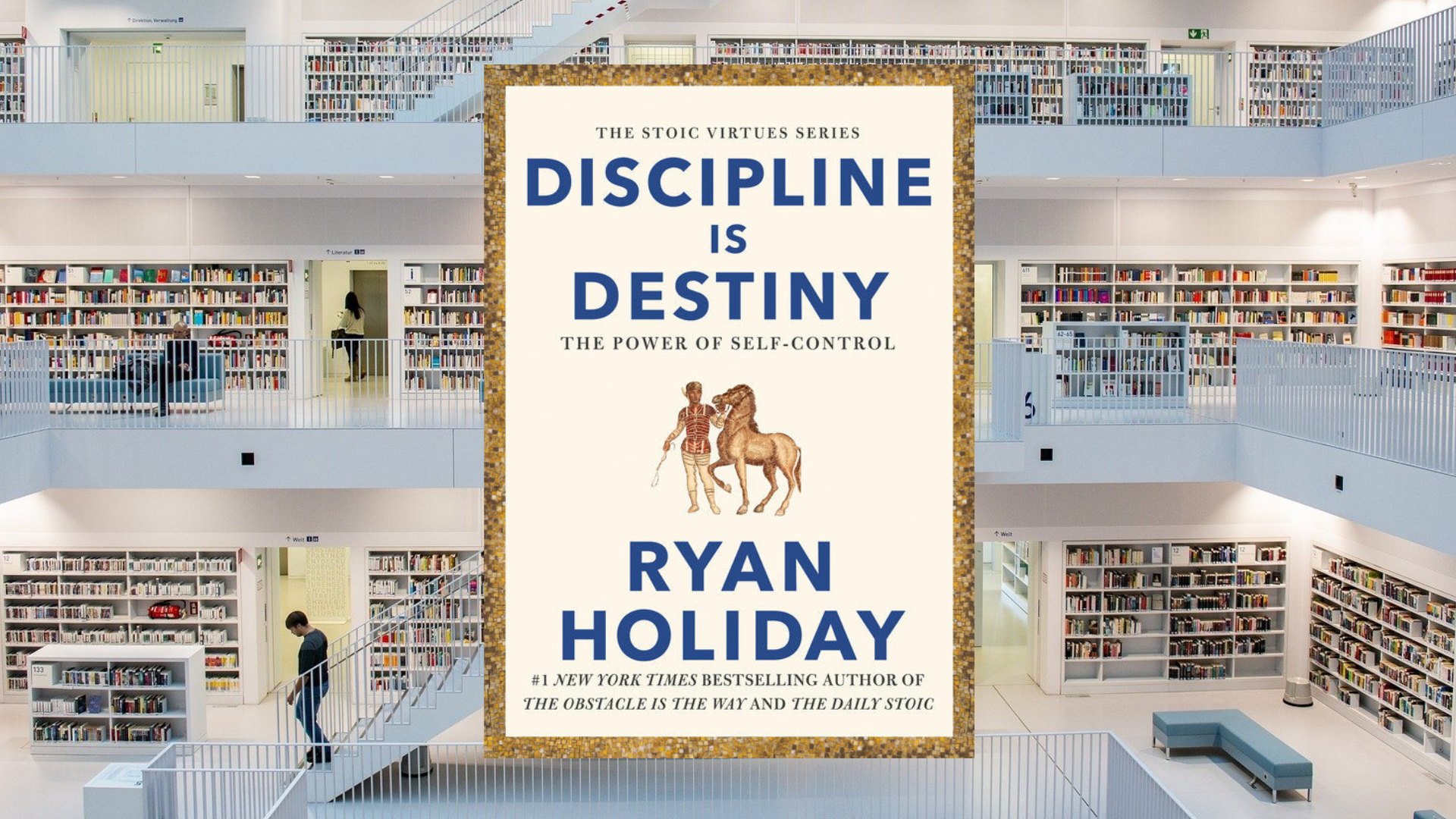
Discipline is Destiny, by Ryan Holiday:
“Most powerful is he who has himself in his own power.”
-Seneca
Self-discipline has traditionally been a hard sell. Self-indulgence, quick dopamine hits, and having a good time have been winning the marketing battle lately, similar to the "battle" between chocolate and asparagus. Or between reality television and educational documentaries.
But what if the problem is simply that we've been thinking about self-discipline in entirely the wrong way?
Up until now, self-discipline may have been the equivalent of a Henry James novel in a TikTok world. But Ryan Holiday's book, Discipline is Destiny, will have you reimagining the whole concept in a much more liberating, fulfilling way.
His aim is to teach you how to harness the powers of self-discipline to fulfill your personal destiny. While everyone's destiny is fundamentally different, everyone's destiny is the product of self-discipline. Your habits shape your character, and your character shapes your destiny, and so Ryan's book goes right to the root and gives you the physical, mental, and emotional skillsets for success.
In the final analysis, self-discipline is prescriptive. It will show you your future. Your environment, actions, habits, and mindsets are constantly shaping your destiny, and this book will show you how to guide this process more intelligently.
This involves thinking of self-discipline in the "proper" way: not as a punishment, as self-deprivation, but as it really is: a pathway to even greater freedom.
Some days will be hard. Actually, that's not true...many days will be hard. The hard days will outnumber the easy ones, but the meaningful days will also outnumber the meaningless ones. Living this way won't always be easy, but it will always be worth it.
Sample Quotes from the Book:
“Think about it: Most people don’t even show up. Of the people who do, most don’t really push themselves. So to show up and be disciplined about daily improvement? You are the rarest of the rare.”
“The good news is that because it’s hard, most people don’t do it. They don’t show up. They can’t even do one tiny thing a day. So yes, you’re alone, out there on the track in the rain. You’re the only one responding on Christmas. But having the lead is, by definition, a little lonely. This is also why it’s quiet in the morning. You have the opportunities all to yourself.”
“The cost is not just personal but shared by us all, in symphonies never written, feats never accomplished, in good never done, the potential of an ordinary day never fulfilled.”
Read the Full Breakdown: Discipline is Destiny, by Ryan Holiday
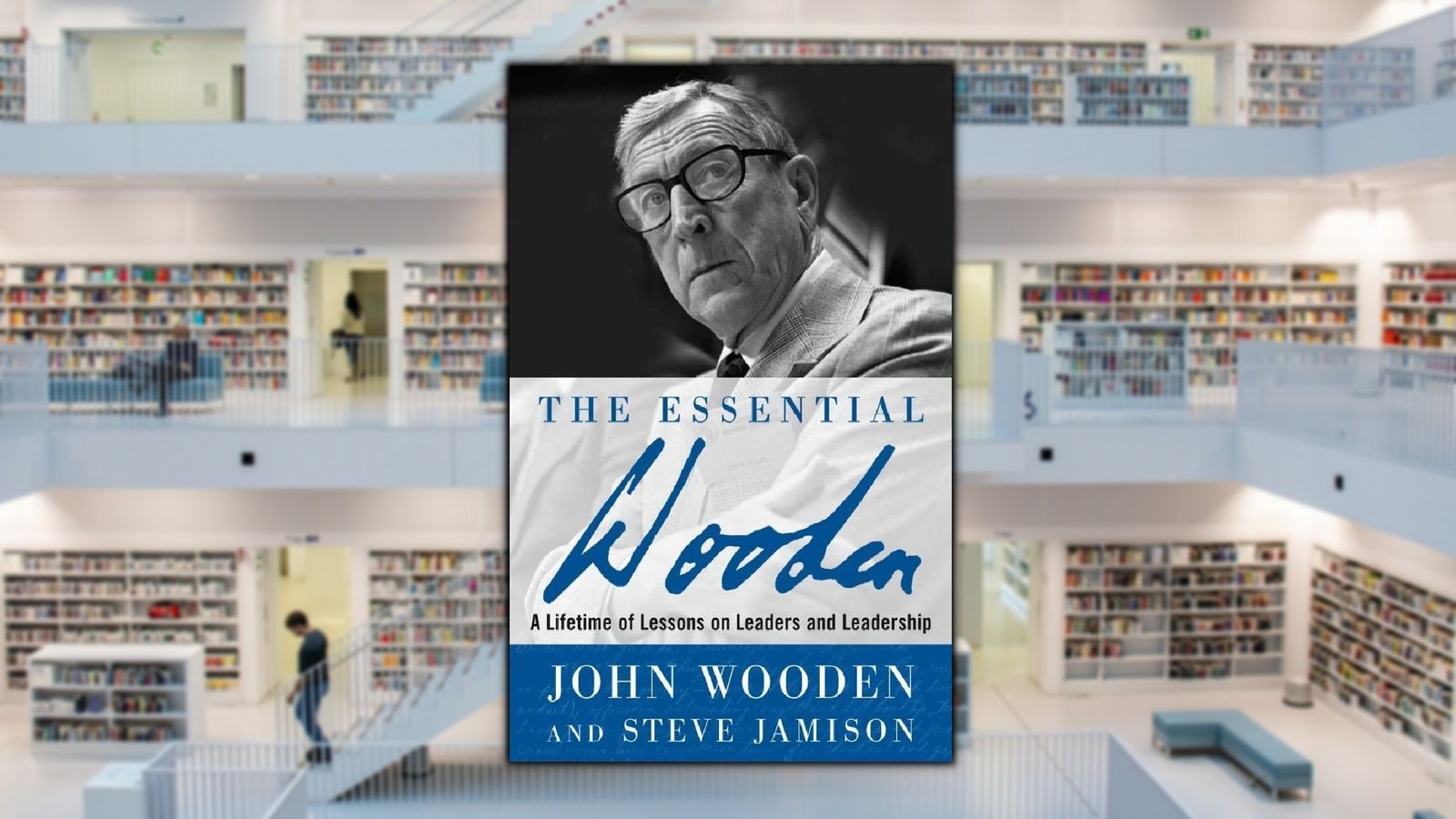
The Essential Wooden, by John Wooden and Steve Jamison:
“Coach Wooden was more upset if we won but didn't work up to our potential than if we lost playing at our best."
-Eddie Powell
It's hard to do your best, much harder than most people realize. By definition, "your best" is the absolute greatest effort you are capable of giving, and sadly, most people just never even come close to that.
Legendary basketball coach John Wooden was a master when it came to seeing potential greatness and infinite self-worth lying dormant inside the players on his teams, and his leadership style - that you can learn to adapt for yourself - was perfectly suited to drawing excellence from the teammates entrusted to his care.
For Wooden, there was a standard that ranked above winning, and he believed that if you give every single thing you have within you to be your very best, then you're already a success no matter what.
Doing your best is all that can ever be asked of you; it's literally everything, and although winning may be a natural byproduct of that supreme effort, it could never be the sole reason for a team's or a person's existence.
I won't pretend that winning isn't important to me. Indeed, John Wooden and his elite basketball players loved to win, but it was the way they played and behaved that was ultimately more impressive than any of the records or the championships themselves.
Disciplined, intensely focused on executing the fundamentals, self-controlled, team-focused, and unselfish, they would have been winners no matter what, and this is because of Wooden's exceptional leadership style.
John Wooden also possessed an immense moral strength that was given expression in many of the actions he took as a coach and leader. For one thing, when racism was still a significant presence in collegiate sports, he refused to enter basketball tournaments that his black players weren't allowed to participate in.
They were a team, and if they couldn't all play, then none of them were going to be there. It was this strict, incredibly demanding coaching style, combined with this gentleness, and a strong, enduring belief in human potential and infinite human worth that made John Wooden such a spectacular role model. One that we would all do well to emulate in our own lives.
There's so much that we can all learn from John Wooden's example, and we're going to examine several of his most fundamentally important lessons here in this book breakdown.
Sample Quotes from the Book:
“Early in his career, John Wooden embraced the belief that success, as measured by each one of us individually, is the peace of mind derived from making the absolute and complete effort to do the best of which you are capable.
The quality of your effort to realize your potential counts first and foremost. For John Wooden that is success. And it is different from winning - beating an opponent in basketball, business, or life.
This is important to recognize: that success and winning are two very different concepts in the world of Wooden and that success is the foremost of the two."
“Competitive Greatness includes a love for the hard battle and teaching those under your supervision the same.
It is the competition itself - a worthy opponent - that gives you and your organization the opportunity to find out how good you are, to reach deep inside and perform at your best when it counts.
This is Competitive Greatness. In my book, the score doesn't always reveal whether you achieve it."
“Make your personal standard of performance - your behavior in all areas - so exemplary that those under your supervision will find it hard to match, harder to surpass. Be hardest on yourself - the model for what you want your team to become."
Read the Full Breakdown: The Essential Wooden, by John Wooden and Steve Jamison
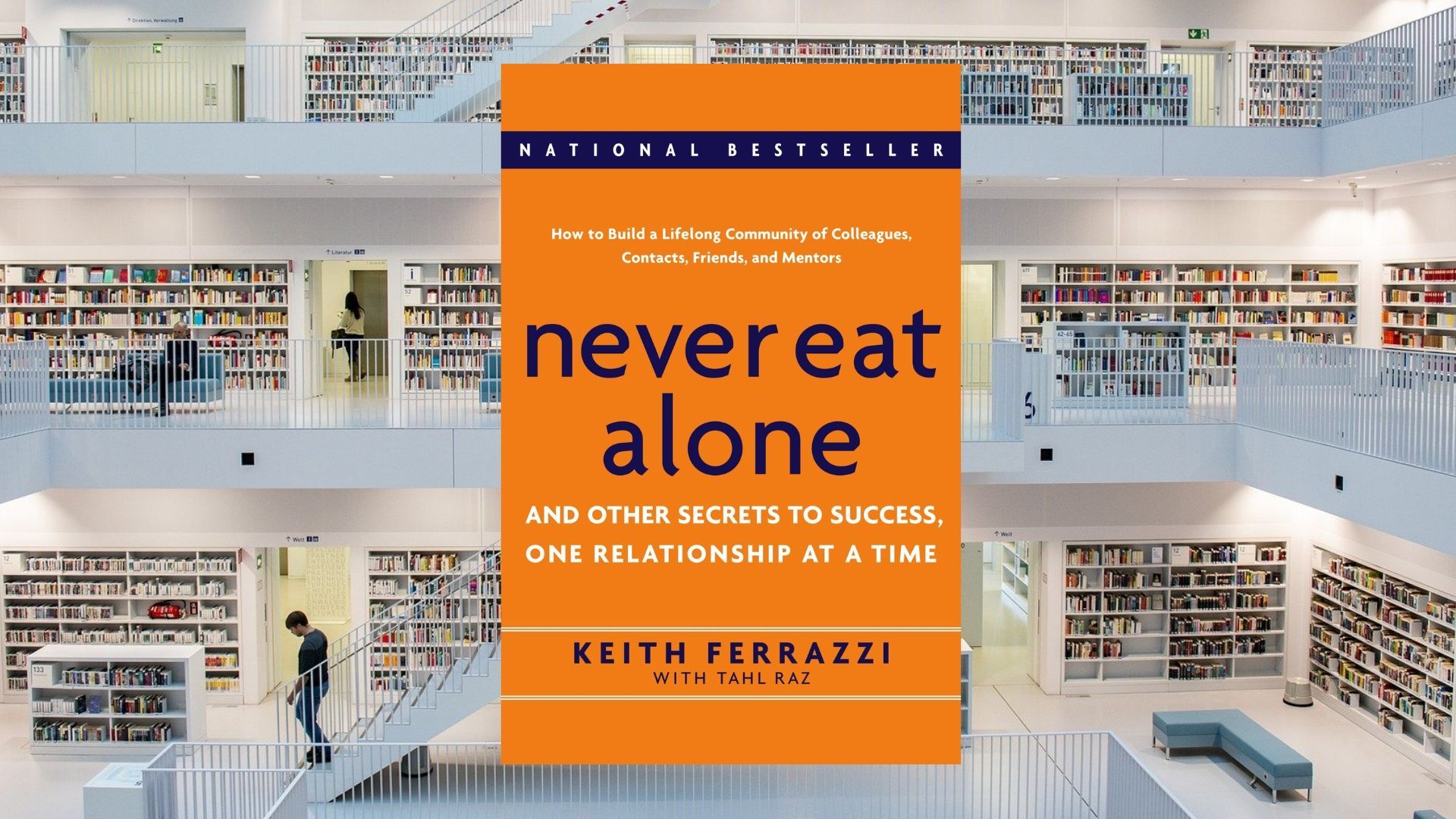
Never Eat Alone, by Keith Ferrazzi:
“Connecting is a philosophy of life, a worldview. Its guiding principle is that people, all people, every person you meet, is an opportunity to help and be helped.”
-Keith Ferrazzi
No one is self-made anymore, if they ever were at all. Total self-reliance doesn't exist either, which is actually great news for all of us, because we rise or fall together.
Connection and relationship are the law of the universe, and this book will help you put that law into action to build a powerful network that will help you realize your greatest ambitions.
In order to achieve what's possible for you in life and business, you need a strong, healthy network full of other altruistic individuals who want to see you succeed, and...more good news...it's never been easier - and more necessary - to do that as it is today.
Keith Ferrazzi became the Chief Marketing Offer at Deloitte & Touche Consulting, the youngest-ever CMO at Starwood Hotel & Resorts, then the CEO of Yaya Media, before starting his own company. He's built up a personal network of more than 10,000+ people that he can rely on to take his calls, and whom he can assist in helping to get what they want in life.
Never Eat Alone is one of the greatest networking books ever written - a certified classic - but it's not literally all about who you have dinner with. Not completely. It's so much more than that, and Keith uses both his own story and the stories of influential power connectors like Katherine Graham, Bill Clinton, and Dale Carnegie to illustrate his best tactics for gaining influence by being valuable to others and cultivating your network.
It's about becoming valuable to the people you're connected to and being a resource for them, someone your whole network can rely on to help them get things done. It's about winning yourself, while making sure that, at the same time, your friends are winning too.
Now is the most exciting time to be alive in the history of the planet, and more opportunities exist today to both get everything you ever wanted and to help other people do the same.
Goodwill isn't finite, and Ferrazzi demonstrates the truth of this statement throughout the entire book. As we assist others and accept their assistance in turn, we expand our total possibilities and begin to access our full potential - together.
Sample Quotes from the Book:
“Today’s most valuable currency is social capital, defined as the information, expertise, trust, and total value that exist in the relationships you have and social networks to which you belong.”
“I learned that real networking was about finding ways to make other people more successful. It was about working hard to give more than you get.”
“The only way to get people to do anything is to recognize their importance and thereby make them feel important. Every person’s deepest lifelong desire is to be significant and to be recognized. What better way is there to show appreciation and to lavish praise on others than to take an interest in who they are and what their mission is?”
Read the Full Breakdown: Never Eat Alone, by Keith Ferrazzi

The View from the Opposition:
No one's ideas are beyond questioning. In this section, I argue the case for the opposition and raise some points you might wish to evaluate for yourself while reading this book.
#1: Turn Up Your Ego When It's Useful
I'll let you in on my process for writing these book breakdowns. What I like to do during the research phase is to go to Goodreads, look at the 3-star reviews, and then search for recurring themes.
The collective wisdom of the internet is quite astonishing sometimes (as is its collective stupidity), but almost invariably when I'm looking through these middling reviews, I'll find something that causes me to reevaluate certain parts of the book, my response to it, my feelings about it, etc.
In this case, the author's ego came up quite often in these 3-star reviews. It was what people saw as the arrogance of Patrick Bet-David that they found offputting, and multitudes of people mentioned this in their reviews.
Now, I have a few responses to these responses. First off, they're probably right. PBD does have a little bit of an inflated sense of self-belief, but you almost have to if you want to operate effectively at the highest levels of business as he does. It pretty much comes with the territory of massive success that you also have your self-belief cranked up to fucking 11.
However, there's nothing written anywhere that says the knob has to stay stuck at 11. You can turn your ego up and down depending on the situation and what you need from it, and I highly recommend that you do. It's like that old saying, argue as though you're right, listen as though you're wrong.
There are going to be situations where it serves you to blow up your self-belief to epic proportions in order to give yourself the power you need to persevere through obstacles and battle through frustrations. And then there are also going to be situations where it will serve you much better to tone it down, admit that you're out of your element, and look to others for guidance.
You're probably going to have to adjust your ego several times throughout the day depending on where you are, what you're doing, who you're with, etc.
In the case of Patrick Bet-David and this book, it's tough to write a business book that's going to be able to rise above all the noise out there without being at least a little bit over the top with respect to ego. If he wrote some careful, measured, timid little book, I probably wouldn't be writing about it right now.
"The test of a first-rate intelligence is the ability to hold two opposed ideas in the mind at the same time and still retain the ability to function.”
-F. Scott Fitzgerald

Questions to Stimulate Your Thinking:
The quality of your questions determines the quality of your life. That's also how you get the absolute most out of any book that you decide to read:
You ask great questions the whole time - as though the book was on trial for its life.
Here in this section are a few questions that can help guide and stimulate your thinking, but try to come up with your own additional questions, especially if you decide to read this book the whole way through...
#1: "Have you taken the time to develop a clear and compelling vision for your future and the future of your company? Does it inspire you enough to sustain you through the inevitable pain and frustration of owning a business?"
#2: "Is your vision compelling enough to others? Have you clearly communicated this vision in such a way that it inspires the people you need to follow you there?"
#3: “If people get closer to you, will they win? Will they do better in life?”
#4: "Create a list of people whose lives have improved because of spending time with you. Is it a long list? Is it as long as it should be?"
#5: "What kind of incentives can you offer people to motivate them to do their best work? Can you perhaps find some way to offer them equity, so that when the organization prospers they profit as well?"
#6: "Do you have a clear, effective framework for making decisions? Do you apply this framework consistently when facing new challenges? Does it help you retain the lessons you've learned so that you can feed back your results and do even better next time?"
#7: "When you make decisions, do you often take the time to reflect on what the reactions of other people are going to be? Or the reaction of the market? Do you have a plan in place for responding to the effects of which you were the cause? How many moves ahead are you looking?"
#8: "What kind of star players do you need to have around you to make success virtually inevitable? What can you offer them to get them to play for you and to stay with you until you've reached the kind of success you've envisioned?"
#9: "What kinds of intrinsic motivations can you tap into when the going gets rough in your business? When the challenges you face are immense, and the survival of your business is uncertain, what keeps you going besides the paycheck? What keeps you on your feet besides money?"
#10: "How much is enough? How will you be able to tell when you've reached your own personal finish line? Will 'more' ever be 'enough'? Or are you willing to remain perpetually unsatisfied?"
"Judge a man by his questions, rather than by his answers."
-Voltaire

Action Steps:
So you've finished reading. What do you do now?
Reading for pleasure is great, and I wholeheartedly support it. However, I am intensely practical when I'm reading for a particular purpose. I want a result. I want to take what I've learned and apply it to my one and only life to make it better!
Because that's really what the Great Books all say. They all say: "You must change your life!" So here, below, are some suggestions for how you can apply the wisdom found in this breakdown to improve your actual life.
Please commit to taking massive action on this immediately! Acting on what you've learned here today will also help you solidify it in your long-term memory. So there's a double benefit! Let's begin...
#1: Don't Lose the Lesson
We all have losses in our past - sometimes significant losses - but the proper response to experiencing a loss is never to allow it to go to waste. You may have taken a loss, but don't lose the lesson.
Think back to a recent loss you've suffered and mine it to the very depth for lessons that you can apply when you face similar challenges in the future. Don't let go of the loss until you've retrieved the lesson!
As Patrick Bet-David says, great processors rarely repeat their mistakes. Especially not painful mistakes. In fact, sometimes the most painful mistakes are the stickiest because if it's painful enough, you'll never forget it. Think about the first (and probably last) time you burned your hand on the stove!
#2: Think Beyond Your First Move
Your competitive advantage in life is the ability to think further ahead than the people you're competing against. Thinking beyond your first move is a critical skill to master, and you can take comfort in the fact that most of the people you're up against just won't do it.
See, most people just go ahead and do the very next thing, without anticipating the possible reaction to their actions, and what they might have to do in response to the effects they've caused. Again, their oversight is your competitive advantage.
This is a mode of living and seeing that needs to become automatic and instinctual, and will, over time, if you keep practicing it. Great chess masters are always thinking several - and sometimes even dozens of moves ahead, and that's why they achieve the top rankings.
The key is to anticipate how others will respond to your move and to deploy additional moves that can't be counteracted. If you do X and the other person is likely to do Y or Z in response, try and put R, S, and T in place so that they can never gain the upper hand.
#3: Implement the "Rule of Three"
While evaluating any decision, always come up with at least three potential moves or proposals for dealing with an issue. This is the Rule of Three. It will allow you to compare various courses of action and it will give you a frame of reference with which to evaluate their individual efficacy.
It all comes back to the ability to think several moves ahead and to anticipate the responses and counteractions of others.
You can't go in blind! Not in situations where there is real money, success, and reputation on the line. You need to be prepared, and following the Rule of Three consistently across time will eventually provide you with the depth of experience necessary in order to make the best possible decision when the time comes.
#4: Compress Your Time Frames
Never, ever, ever compromise on speed, execution, or efficiency. These are three areas where you can and must have it all. Instead, compress your timeframes. Do more in less time. Expand time such that it's almost like you're living in the Matrix while everyone else is speeding past you on a rollercoaster.
Business in modern times is all about speed, execution, and efficiency, and the pace of business will never be slower than it is today. It's only getting faster, and so you must be faster if you wish to remain relevant.
How do you turn this into a concrete action step? There are multiple approaches you can take, but they all come down to expanding the time you have and, most importantly, not wasting it.
Even consciously recognizing the infinite value of time will put you in a better position to win. Bring your awareness back multiple times a day to how infinitely valuable your time is, and simply doing that will inspire you never to waste a single moment more than you have already.
Additionally, pay people to do anything that they can do for you, as long as they can do it at least 80% as well as you can. Be extremely aggressive about this. Eliminate everything that's not absolutely essential when it comes to achieving your goals. Give yourself less time to complete your to-do list, thereby taking advantage of Parkinson's Law and allowing you to finish your work in half the time.
Aggression! Speed! Execution! Efficiency! Sacrifice almost anything else but not those. Never those.
#5: Seek Win-Win
Your average competitors are only thinking about what's in it for them. When they're dealing with prospective customers, structuring deals, or networking...all they're thinking about is what they stand to gain from the interaction. What they can get out of it. Don't be like them!
Instead, what you can do is literally obsess over how you can make your customers successful. How you can help your coworkers win. How you can lead your team to victory. Help the people around you win, and be relentless about searching for opportunities to make that happen.
Again, this is a mode of living and seeing that it pays to develop, especially since it doesn't come naturally to most people. Business (and life) is an infinite game and there can be multiple winners. The universe is obscenely rich, and there is more than enough wealth, success, and happiness for us all to enjoy.
"The path to success is to take massive, determined action."
-Tony Robbins


About the Author:
Patrick’s amazing story starts with his family immigrating to America when he was 10 years old. His parents fled Iran as refugees during the Iranian revolution and were eventually granted U.S. citizenship.
After high school, Patrick joined the U.S. military and served in the 101st Airborne before starting a business career in the financial services industry. After a tenure with a couple of traditional companies, he was inspired to launch PHP Agency Inc., an insurance sales, marketing, and distribution company – and did so before he turned 30.
PHP is now one of the fastest-growing companies in the financial marketplace. Patrick is passionate about shaping the next generation of leaders by teaching thought-provoking perspectives on entrepreneurship and disrupting the traditional approach to a career.
Patrick speaks on a range of business, leadership, and entrepreneurial topics including how and why to become an entrepreneur and the importance of learning how to fully process issues.
From a humble beginning as a young immigrant escaping war-torn Iran with his parents to founding his own company, Patrick has gained a first-hand understanding of what rags-to-riches means and how it is fueled by freedom and opportunity – the core tenants of the American Dream.
Additional Resources:
Patrick-Bet-David.com | Main Website
Valuetainment | YouTube Channel
PBD General Mastermind | Webinar
Five Moves for the Week | Free Newsletter
This Book on Amazon:
Your Next Five Moves, by Patrick Bet-David
If You Liked This Book:
Doing the Impossible, by Patrick Bet-David
Discipline is Destiny, by Ryan Holiday
The Education of Millionaires, by Michael Ellsberg
The Second Mountain, by David Brooks
Be Your Future Self Now, by Dr. Benjamin Hardy
The Gap and the Gain, by Dan Sullivan and Dr. Benjamin Hardy
Personal Development for Smart People, by Steve Pavlina
The 10 Pillars of Wealth, by Alex Becker
The Almanack of Naval Ravikant, by Eric Jorgenson

